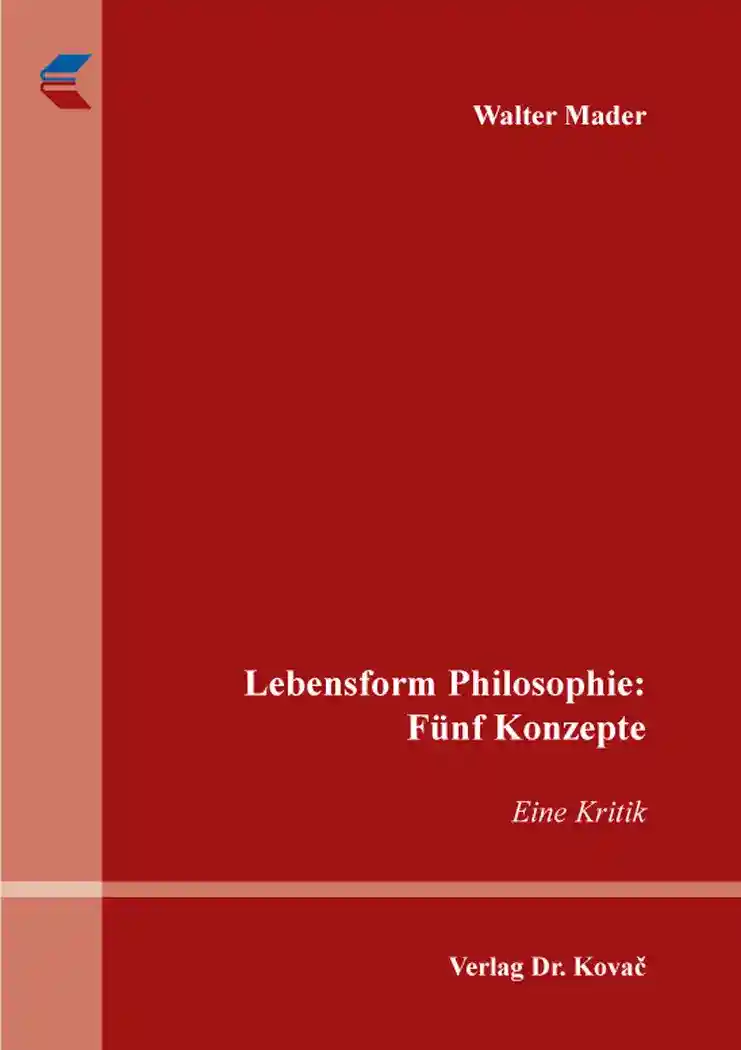Walter MaderLebensform Philosophie: Fünf Konzepte
Eine Kritik
Schriftenreihe Philosophische Praxis, volume 8
Hamburg 2023, 322 pages
ISBN 978-3-339-13384-7 (print) |ISBN 978-3-339-13385-4 (eBook)
About this book deutschenglish
The study evolves from the simple question: Is it philosophy or theology to have more influence on human life in mastering man's destiny or man's problems, whatever may arise, for instance by comforting.
The vital importance of philosophy became already evident in ancient Greece (e.g. with Socrates), in the Roman republic, in the Roman empire, in the transition period from antiquity to the middle ages, to the medieval scholasticism just as in beginning modern times: philosophy is practised as a form of live. Five models, five centuries: five stars in history of mind – that is to say Marcus Tullius Cicero, Lucius Annaeus Seneca, Anicius Manlius Severinus Boethius, Henricus de Gandavo, Erasmus Roterodamus – are associated with our matter concerning form of life. Hence we ask: Are these models really qualified for this modus vivendi?
Cicero being a vivid example for such qualification himself sings an enthusiastic hymn of praise, a panegyric on the divinity of Philosophia, though from a slight distance.
Senecabehaving as a true human being, imperfect, fallible, weak, but also ingenious and excellent, is both a defender of philosophy and a philosophic form of life and an adorer of wisdom.
The five books written by Boethius titled "consolatio philosophiae" are a broad speech for the de¬fence of philosophy in practical life, nothing else. Based on virtue philosophy is the right way finally culminating in God.
For Henricus knowledge and knowledge, being not the same, have to be seen different; you should differentiate "useful" from "necessary" and "superstious" (sc. Knowledge). Any vicinity to paganismus is to be avoided; "ne quid nimis!" must be respected. The final τέλος ("telos", "aim") crowning the existence of all human beings, is God and his beatitudo.
Erasmus creates a highly intelligent caricature defaming the contemporary business in scholarship and science. By means of irony and humour he succeeds in transfering the principle of "ridentem dicere verum". The difference of meaning in "foolishness" and "wisdom" seem to be suspended; the relevance for man's practice of life, however, gets sublimated. Erasmus is likely to be religious: For him, too, God is the absolute sovereign!
In answer to the initial question we can summarize, that according to our expectation, the result has got to be heterogeneous, caused by the individualism, due to everybody's indiduality.
Kontaktmöglichkeit
Keywords
BoethiusCiceroConsolatio PhilosophiaErasmus von RotterdamHeinrich von GentLebenspraxisPhilosophie als TherapieScholastikSenecaSpätantikeStultitae LausWeisheitIhr Werk im Verlag Dr. Kovač

Möchten Sie Ihre wissenschaftliche Arbeit publizieren? Erfahren Sie mehr über unsere günstigen Konditionen und unseren Service für Autorinnen und Autoren.
